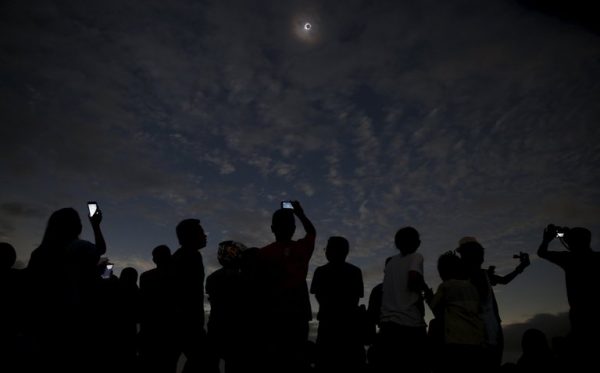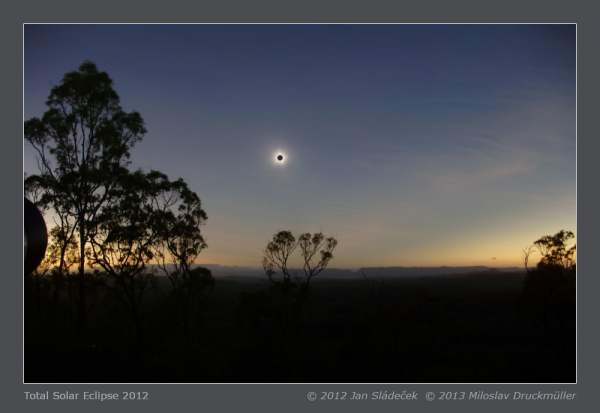"Yes, I am well aware that nature -- or what we call nature: that totality of objects and processes that surrounds us and that alternately creates us and devours us -- is neither our accomplice nor our confidant." -Octavio Paz
For most of us heading to the path of totality, we're in for an incredible experience. If we get clear skies, it will take roughly an hour for the Moon to pass in front of the Sun's disk completely, and after that we'll get just over two minutes of totality: an experience like no other. Yet if you're not careful -- or if you get too excited about one particular thing -- you might miss the best parts.
 Messing around with photography is a great way to miss the incredible sights, sounds, and experiences of a total solar eclipse. Unless you've experienced enough total eclipses that you don't mind missing one, leave photography to the pros. Image credit: Beawiharta/Reuters.
Messing around with photography is a great way to miss the incredible sights, sounds, and experiences of a total solar eclipse. Unless you've experienced enough total eclipses that you don't mind missing one, leave photography to the pros. Image credit: Beawiharta/Reuters.
A lot of photography enthusiasts are planning to capture the eclipse on film (or digitally), but that may be a very poor decision. Others are planning on using binoculars to get a better view of the corona, but that has extreme dangers. Others aren't sure whether they need their eclipse glasses or what all the things they should look for and try to experience are. But there are too many scientists passionate about getting the right information out there to let this event go by without sharing that knowledge and wonder with the world.


I think you may want to add a caveat to #2. You can take your glasses off and look at the sun at totality only if you're in the narrow region of the country where the eclipse is total. The further off that path you are, the less safe it is. The vast majority of Americans going out to look at the eclipse will not be in that region. Thus for them, "take off glasses during maximum" is not good advice.
I think where I am I'll get to 90% or 80% coverage. My glasses will stay on.
Isn't this a golden opportunity to retest the bending of light experiment especially with our modern state-of-the-art equipment rather then depend on Eddington's fuzzy, inconclusive pictures taken with primitive equipment?
That's some weird definition of "synopsis".
Here is a pretty cool animation you can run for your location to show what it will look like, type in zip code:
http://time.com/4882923/total-solar-eclipse-map-places-view/
Vague, regurgitated hash off other sites. Yawn!
@# 5
The title of this session is 'Mostly Mute Monday' in 200 words or less.The warnings are always going to be the same regarding eclipses. As Eric #1 has noted, off axis warnings also need to be in place.
It may seem like dog barf to you, but consider how many people get blinded by the light.
;)
@Kasim Muflahi#2: The bending of light experiment has been repeated many times since Eddington's day. Astronomers from Lick Observatory went to Australia for the 1922 eclipse and repeated the observations. It was done again during an eclipse in 1952 by Yerkes Observatory astronomers who travelled all the way to Khartoum, Sudan to see it. In 1973, astronomers from the University of Texas went to the Chinguetti Oasis in Mauritania to do the same thing. Each time they found results reasonably consistent with General Relativity. It seems people are going to try to do the same thing with this upcoming eclipse. NASA has even given instructions on how to do it:
https://eclipse2017.nasa.gov/testing-general-relativity
Donald Bruns for one is going to give it a try:
http://www.skyandtelescope.com/sky-and-telescope-magazine/beyond-the-pr…
Thanks for the update because all I hear in the forums I frequent is reference to Eddington's expedition. It's nice to know that even amateurs are jumping on the bandwagon but they're doing with the premise that Einstein's General Relativity is right BEFORE they've done the experiment. They should go there with an open mind so that they can spot a mistake if there is one. Otherwise, they won't spot it.
"Vague, regurgitated hash off other sites. Yawn!"
I am guessing this attitude is called intellectual snob :-)
There is already a lot of other good evidence that General Relativity is correct by the way. If you have ever used a GPS app to navigate you are able to pinpoint your precise location only because the designers of the GPS system took the predictions of Special and General Relativity into account. When GPS was first designed, some engineers felt that noticeable time dilation due to the relative motion of the satellites (special relativistic effect) and gravity (general relativistic effect) would not occur, so they launched the first satellite without taking this into account. However, they observed the 38 µs per day time dilation predicted by SR and GR, which would cause a navigational fix to become false after only two minutes, and errors would accumulate at the rate of 10 km per day, rendering the whole system worthless for navigation in short order. Subsequent satellites and GPS receivers compensated for the gravitational and special relativistic effects, which is why it works so well.
Kasim,
I am curious. Why would the result of an objective measurement be different based on the mindset of the person making the measurement? Either light bends in a way that is quantitatively correct according to relativity or it does not. Why would the belief of the measurer play any role?
Let's ask Madonna.
Kasim: Madonna, what's the objectivity of vision?
Madonna: Your eyes will see what you want them to see.
You see, prior belief colours what you see and perceive.
Sean T:
#13
I don't disagree with the bending of light by gravity because gravity exists. What I don't agree with is the interpretation put on it i.e. that it's due to the curvature of spacetime.
How do lenses bend light? or how do stereoisomers bend light. For the last 2 questions, it's the electromagnetic fields of the molecular orbitals interacting with those of the photons.
It could be that the photons of starlight are interacting with the electromagnetism of the gravitational field created by the large mass such as the sun.
Prisms bend light at the interfaces due to the large refractive index difference between the glass and the air. I could be wrong, but I'm betting there isn't much of a refractive index difference between interstellar space and 'in-solar system' space.
I'm also willing to bet that when scientists test for GR, they do their best to account for all such effects and GR is concluded because after you take such effects into account, there is still additional bending that is not predicted or explained by NM, only by GR.
eric, I agree with you. But science has a lot of holes in it. I even agree with the numbers that GR predicts. But, I say again, it's the interpretation put on it. It may not be the curvature of spacetime.
NM was developed before field theory was and before we knew about electromagnetism. And I suspect that results Einstein got were due to inclusion of the latest findings at the time.
There reason why I can't accept curvature of spacetime is that, in order for mass to bend spacetime at a distance, its influence should be communicated to the distant spacetime at the speed of light. This implies that mass radiating something physical which we call a gravitational field where it would have equipotentials with perpendicular forces we call the gravitational force. The field would be quantised like the EM field so would be different from that described by GR.
Another reason I'm suspicious of science is that legitimate forces have fields emanating from sources; equipotentials withe force perpendicular to the equipotentials. But the weak and strong forces neither have a field nor a source - they somehow exist as independent entities.
So, numbers are correct but the explanation attached to them are dubious.
I fully understand the tendency toward bias in measurement. My question is why Kasim or anyone else would think that scientists WANT to just blindly confirm relativity. Finding a result that is in opposition to the established paradigm is the surest way to notoriety in the scientific community, and is the way science advances. Any scientist worth his salt would be overjoyed to find a robust experimental result that withstands scrutiny by the scientific community. I don't understand why antirelativity looks think otherwise.
Sean T,
There's good science to be done when operating within a paradigm. One example would be to reduce the size of the experimental error bars; Eddington's were large, subsequent observations' were smaller, thus increasing the experimental corroboration of the theory.
All I can say to Kasim Muflahi's other responses is to quote Carl Sagan: "The truth may be puzzling. It may take some work to grapple with. It may be counter-intuitive. It may contradict deeply held prejudices. It may not be consonant with what we desperately want to be true. But our preferences do not determine what's true."
Absolutely true. The curvature of spacetime may have nothing to do with the truth. Just because it's counter-intuitive doesn't mean it's true. It's also an interpretation of the prediction of GR.
I do NOT understand this, but being 13 doesn't mean that I'll know it.This is one interesting subject I should be learning about.
Now that I have properly read all your comments on this, are you guys scientest or something?
Of course, John. I am not minimizing the value of the work done by scientists operating within a consensus paradigm. I am merely stating that the finding of results that conflict with the accepted paradigm is something that just about every scientist would regard as the pinnacle of his or her career as a scientist.
The anti-science kooks always claim that scientists are fighting tooth and nail to maintain the status quo. I was just pointing out that nothing could be farther from the truth.
The only difference is that real scientists actually know what it takes to overthrow an accepted paradigm and don't just assume from a single anomalous observation that they've succeeded. Reference the FTL neutrino observations from CERN as an example. An anti-science kook would have stated that these results proved relativity wrong. Real scientists in this case worked very hard to show that their results were in error. That is generally the best way to show a result valid, namely do everything possible to show that the result is not valid. Then if you fail to invalidate the result, the result MAY be valid. Kooks skip this step all the time, but to their credit, despite their desire to present a result that would imply new physics, the CERN scientists actually did this step and found their error.
Sean T:
Belief protection. Either scientists disagree with him because his argument is poor...or because they have some ulterior motive for doing so. But the former is psychologically upsetting, so he concludes it must be the latter.
Takaia:
Some are, some aren't. Welcome and feel free to ask questions!